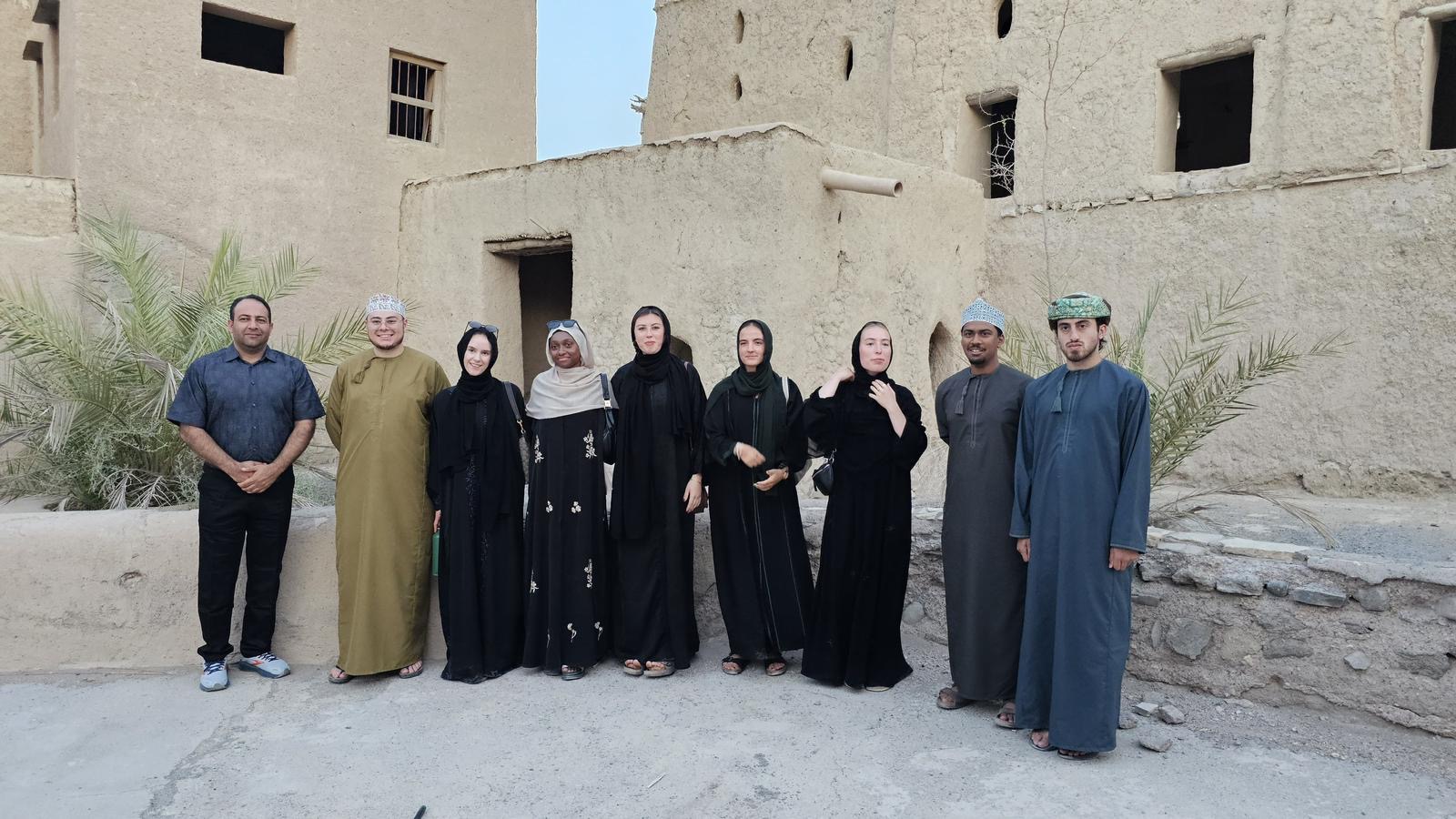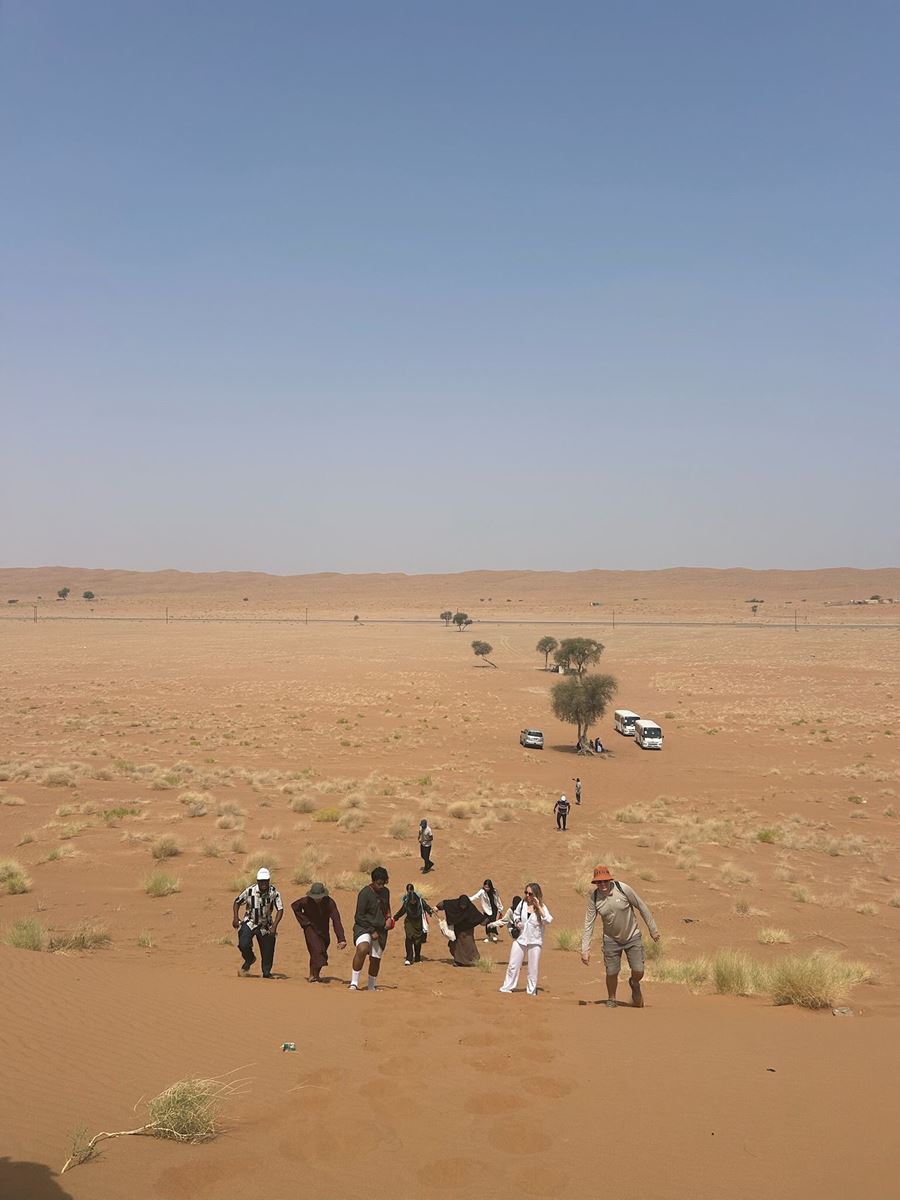Sam Lailey, ALS 2025 Participant
As a recent Arabic and Spanish grad from the University of Manchester, I originally applied to the BOS Arabic Language Scheme to further build upon my Arabic language. Yet the scheme has done far more than keeping my brain ‘working’ over these summer months.
It has uncovered a diverse Arab world that I have only just begun to discover.
I had never visited the Gulf before. In fact, my experience of the Arab world was limited to my year abroad in Morocco. So, when I landed in Oman, I was unsure of what to expect. No sensory overload, or bombardment of commotion, I instantly noticed the chaotic hustle and bustle of Morocco was absent. In comparison, everything was calm and orderly. My first encounters with the Omanis at the airport were relaxed and light-hearted, a gentle sign of what was to come.
Now, four weeks in, Oman just seems to keep getting better.
Experiencing Oman:
The first few weeks have been exciting as we have got to know the Sultan Qaboos Institute and one our fellow course mates. Our residence is situated in Manah, a quiet and sleepy town which has turned out to be much more than it initially seemed. The town boasts its own historical charm, with both a fort and ancient village, which appears to be fossilised in time. And for those craving more history, it is only a 15-minute taxi ride away from the far larger city of Nizwa, which was Capital of Islamic Culture in 2015. Manah also serves as a fantastic playground to experiment with traditional Omani attire, host to a limitless number of tailors and dressmakers.
From Jabal Akhdar to Jabal Shams, we have been fortunate to see much of Oman’s varied and unique natural beauty. A particularly fascinating element of this has been exploring the ancient aflaj irrigation systems, engineering marvels that breathe life into otherwise rugged and rocky terrain. In Misfat al Abreyeen, we followed a falaj (irrigation channel) along its journey, above darting fish and croaking toads, discovering groves of date palms and bananas along the way.
.jpeg)
Most recently, we travelled to my favourite place of the entire trip, Sur and the wadis nearby. A sleepy seaside town, Sur is stunningly beautiful. We watched as South Asian workers and their families flocked to the beachside to enjoy the golden hours before sunset, the children splashing in the clear blue water. But we saved the best for last, with our visit to Wadi Shab. This gem is nestled deep in a winding canyon, and at its end lies a waterfall which is sheltered by a cave half submerged in water. To get there, we took a boat, followed by an hour hike and another half-hour swim between towering cliff faces. Awesome in the fullest sense of the word. And for nature nerds such as myself, it was teeming with wildlife. I spotted a pair of Egyptian vultures, several species of butterfly and western reef herons along the way.
.jpeg)
The Arabic Language Scheme, like no other:
Our knowledge of Omani culture has expanded leaps and bounds. Arabic language development is of course one crucial element of the scheme; however, this has always been combined with the exploration of specific cultural themes. Lessons have also been interspersed with various educational trips; we have attended conferences on Omani youth culture, the tourism industry, as well as visiting the Regional Centre for Science and Technology, which specialises in AI and robotic programmes in particular. I get a sense that the Sultan Qaboos Institute does not want us to only come away with an idea of Oman’s historical splendour, but to gain an understanding of where the country’s future is headed. All of this has been reinforced by our Omani language partners. Young, adept and informative native speakers, our partners have been an integral part of our learning, who for many of us have become good friends that we will be sad to leave behind.

The Diversity of the World in Oman:
When we learned that the US delegation would not be joining us, most of us were admittedly disappointed. Less new faces, fewer interesting conversations. But in retrospect, the Yankees’ loss was our gain. We were suddenly thrown into a world where English no longer reigned supreme. If anything, this has been immensely refreshing. And since Arabic has filled the void as lingua franca, our Fusha conversational skills have undoubtedly benefitted.
The sheer diversity of the students on the programme means I have been able to learn about regions of the world that I had scarcely even thought about before. The delegation from the Comoros Islands have charmed us with their humour and rhythm, which they deploy in earnest through their national dance. Individuals from countries as varied as Ghana, Hungary, Pakistan, Iran and Brunei have offered their own unique perspectives on the world, sharing wonderful snippets of their cultures. The biggest character of the lot has been Ali from Tanzania - if I earned one rial for every joke he made, by now I’d surely be a billionaire. But he has also successfully managed to instil us with some basic Swahili phrases; as we come down for breakfast every morning, we exchange “habari saboris” instead of “good mornings".
Importantly, the presence of each one of these countries is a testament to Oman’s deep, and at times historically complex, connections with the wider world. This is further reflected in Manah’s wider community, where the local shops are almost entirely staffed by South Asian worker. Luckily for us, Marjan (one of the fellow Brits undertaking the scheme) has Bengali heritage, which has given us a quick in among the Bengali workers who form the town’s beating heart. From watching games of carrom (a popular South Asian table-top game) with these Bangladeshi locals, to being generously offered more yoghurty doi than we could ever hope to eat, this unconventional and often-hidden side to Omani society is something I am grateful to have experienced. It has been the diversity of people who have truly made this experience feel like home.
.jpeg)
British Culture in Oman:
Cultural Day, provided an opportunity to showcase our different cultural backgrounds to an Omani audience. Students from each country were tasked with performing something culturally symbolic from their homeland and providing a flavour of their country’s cuisine. The British delegation performed a ceilidh, as well as delivering a presentation on the meanings and origins behind common British phrases and idioms. But it was the cook-off that ignited the fiercest competition. The boys managed to cobble together a Chicken Tikka Masala, that gave even the kitchen’s Pakistani chefs a run for their money. However, in the end it was the girls who stole the show with their apple crumble
Final Thoughts:
Throughout, our experience has been underpinned by the warmth and depth of Omani hospitality, something which is hard to put into words. Everyone I have met has been more than willing to go out of their way to make us feel at home. Whether that be the amazing language partners, who patiently endured our imperfect Arabic riddled with grammatical mistakes; or the Omani boys who let me join their daily football sessions; or our teachers, one of whom was kind enough to invite us to his relatives’ engagement party (shout-out ustadh Muhana).
As my adventure in Oman comes to a close, I’m hoping this visit won’t be my last. There’s much on my future to-do list, the Dhofar mountains and Salalah ranking at the top. And as I look back on my time here, I feel that every second of it has been worth it. No exaggerations, no hyperboles. In the concise words of my dear Tanzanian friend Ali, “Habibi, come to Oman”.

Find out more about the Arabic Language Scheme here.